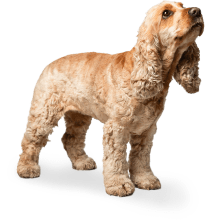

A guide to itchy skin in dogs
Itchy skin can be so frustrating for your dog! Have you noticed they spend most of their day (or night!) licking at paws, rolling on carpets, headshaking or constantly biting and scratching himself? These are all signs your dog has itchy skin, and it can be really uncomfortable to live with.
Itchy skin is usually a lifelong problem. The sooner you work out what’s causing the itch, you’ll have a better chance of treating it before permanent skin damage occurs.
What causes itchy skin in dogs?
There are lots of causes of itchy skin, including canine dermatitis and some dogs can be affected by more than one cause. Some common causes include:
Ectoparasites
Some dogs are super sensitive to fleas ticks or mites and can have an allergic reaction to the flea bite, causing inflammation and itchy skin.
Food allergies
Foods such as beef, chicken or egg can create an allergic reaction that leads to signs of vomiting and diarrhoea, but also itchy skin. If you noticed both gastrointestinal and skin signs, this can be a sure sign of a food allergy.
Allergic skin disease
If you're wondering ‘why is my dog itching so much?’ they may have allergic skin disease. Your dog can be allergic to just about anything unfortunately. Common dog skin allergy triggers are things in the environment such as pollen, grasses or dust mites. Some dogs can even be allergic to themselves!
Skin infections
Skin infections can be the reason your dog has itchy skin. Bacterial and yeast infections can develop quickly and become very painful. Common signs include hair loss, yellow or green discharge and inflamed skin.

How to help stop my dog from itching
Use prescription strength flea and worm treatment regularly, especially if your dog's itching is brought on by fleas. Prevention is much easier (and less uncomfortable) for your dog, so add a reminder to your calendar today to keep on top of your dog's flea and worm treatment. Read our guide on how to get rid of fleas in dogs.
Bathing
Bathing your dog once a week will help reduce the inflammation in the skin. Look for ingredients such as oatmeal that provide soothing relief to sore skin. Another helpful ingredient is chlorhexidine, an antiseptic that treats surface infections.
Medication
Some may need medications to provide itch relief for dogs. These can be medications such as prednisolone, apoquel or cyclosporine, or injections such as Cytopoint. A veterinarian can prescribe all of these drugs after a health check at the clinic. These medications reduce inflammation and stop the brain from receiving itchy messages from the skin, reducing the need to scratch or itch.
Antihistamines
Antihistamines are a popular non-prescription treatment option, but most dogs will not respond well enough to antihistamines to control their itching completely and may need stronger medication to bring relief.
Distraction
Keeping your dog's mind off their itchy skin can help break the itch cycle. Take them for a walk, use puzzle feeders or lickimats and play training games at home to keep their mind focused on other fun activities.
Brushing
Brushing is an enjoyable experience for you and your dog. Daily brushing can help remove dead hair or dander. Brushing improves circulation and distributes oils from the skin onto the coat increasing the ‘shine’ we associate with healthy skin.
What can I give my dog orally for itchy skin
There are many dog supplements designed to support pets with itchy skin, and not all are as effective as the packaging would lead you to believe. Look at the ingredients list and ask your vet for their opinion too.
Omega 3 and 6 fatty acids
Omega 3 and 6 fatty acid supplements help reduce inflammation in your dog's skin. They’re an excellent ingredient for dogs who suffer long-term with itchy skin. Studies have shown omega 3 and 6 fatty acid can help reduce itchy skin and support skin health.
Biotin
Biotin is another ingredient to look for. It helps with dull or flakey skin, and is particularly useful for dogs with nail disorders, common in dogs with itchy skin.
Vitamin E
Vitamin E has anti-oxidant properties. This means it helps to reduce inflammation naturally within the body. It's a natural supplement that has excellent health benefits both for skin and overall health.
Nutritional considerations for dogs with itchy skin
Dogs with itchy skin often need support in a few different areas. Nutrition is an important part of their overall care.
Some dogs with food sensitivities may be recommended a hypoallergenic diet by their vet. These are prescription diets available from vet clinics, and for best results, your dog will need to stick to this food only (no extra treats!).
Grain-free diets are popular at the moment for skin support. While true grain allergies are rare, it's important to know that grain-free diets have been linked to a heart condition called dilated cardiomyopathy. Always check with your vet before switching to a grain-free option.
Summary
Itchy skin in dogs can be a complex, long-term concern. Several options are available to help manage your dog’s skin health – from nutritional support and lifestyle changes to vet-recommended care. Every dog is different, so what works for one may not work for another. While it may not be possible to resolve the itch entirely, with the right approach, most dogs can stay comfortable and enjoy life as usual.
Important health information: The content of this blog is for information purposes only and isn't a substitute for professional veterinary advice. If you're worried about your pet's health, please contact your vet.
Previous article
Luxating patella in dogsUpcoming article
Reverse sneezing in dogs




